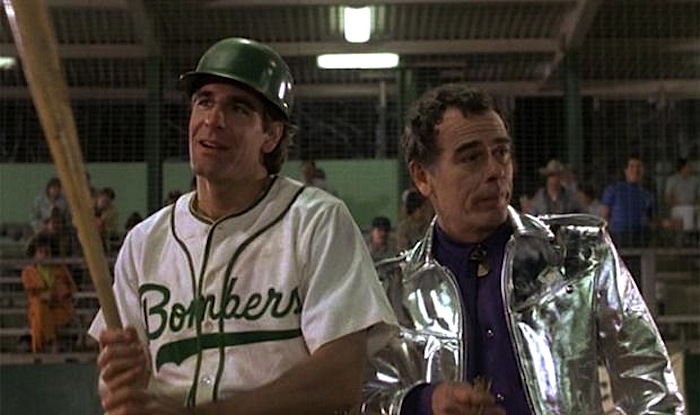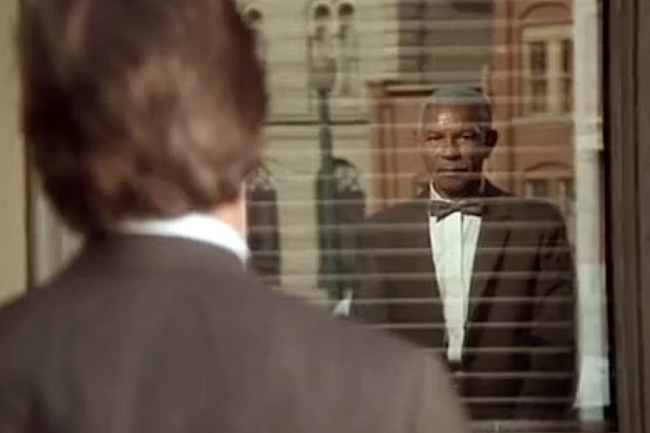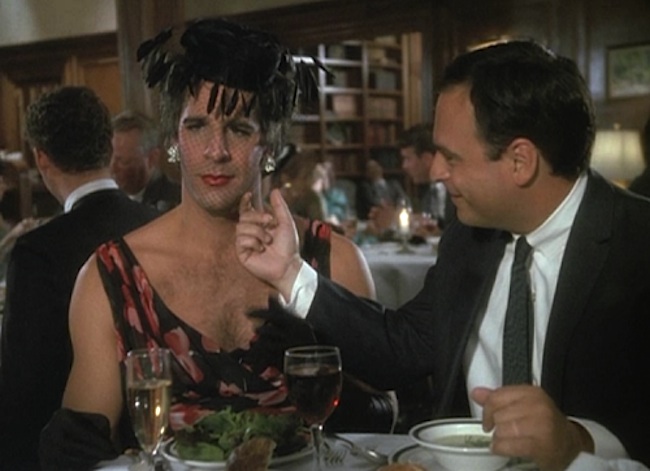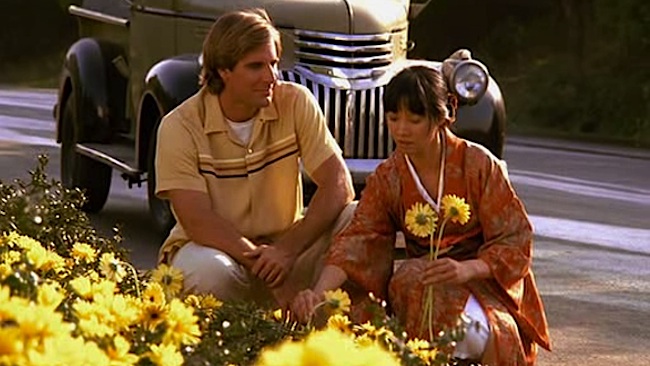It’s Leap Day, so naturally my thoughts have turned to Quantum Leap. But given our current national political mood (I think “enraged and frothing” sums it up) I’ve spent the last few weeks thinking about what Quantum Leap had to say about America—and how the creators of Quantum Leap took a particularly weird subgenre of road trip show, and turned it into a blueprint for how America could live up to its potential.
TV Tropes has a name for a particular feel-good subgenre: “Woobie of the Week.” If I’m interpreting it correctly, these shows follow morally conscious do-gooders as they try to help a different downtrodden person each week. They are a weird amalgamation of anthology show, road trip, and moral lesson, and they’re usually either strictly materialistic or overtly spiritual, and focused on local issues. Quantum Leap took the basic premise of the Woobie of the Week show, in which a downtrodden person is rescued by an outsider, and made it a far more visceral experience by merging the “Woobie” (downtrodden person) and the helper (Dr. Sam Beckett) into one character.
The pioneer of the Woobie subgenre was a 1960s anthology show called Route 66 which celebrated two things: American car culture and American diversity. At a time when most people lived their entire lives near their families, didn’t travel much, and dressed up for plane rides like they were going to the opera, Route 66 gave viewers two young men (clean-cut! Ex-military! No Beatniks here!) traveling the country in a cherry red convertible, learning about subcultures, and often helping people in need. While these people are occasionally haunted by larger issues (traumas from World War II, for instance) more often the guys stumble into standard-issue shady business deals, terminally ill women who want one last shot at romance, and, weirdly, dozens of violent revenge plots. The theme here was that America was great, full of life and culture to explore, and that sometimes individual Americans needed a hand.
Fast forward a few years and you find a TV schedule flooded with shows meeting the basics of Woobieism: a third party with unique strength or perspective, who is often travelling the country, comes into town and helps an American in need. Some of the Woobie shows, like MacGyver, Knight Rider, and The A-Team, melded hero-of-the-week plots with ’80s action, while others like Starman and The Incredible Hulk used sci-fi elements to give their heroes extra powers. But as you watch these shows, you notice a giant departure from Route 66’s feel-good Americana, because often the trouble the heroes find is symptomatic of larger problems with the country. Cities are rife with drug abuse and corruption; small towns are held hostage by villainous factory owners. These gave way to two overtly religious Woobies, which took the traveling anthology show and made it cosmic: Highway to Heaven and Touched by an Angel. Both of these shows relied on the premise that God was using angels to intervene in human life—but normally, even with the addition of divine intervention, the problems were personal and domestic.
Despite its structural similarities to other Woobie shows, Quantum Leap used its airtime in a very different way. Even before the last-season network mandate to include more historical figures, QL looked back at the last 30 years of American history and said, What the hell? Shouldn’t we be doing better than this?
Sam did, of course, often leap into ordinary family situations—the boxer who needs to win a match to raise money for nuns, the pianist who has to help his girlfriend stand up to her controlling mother, the understudy who has to save an alcoholic actor from himself—but more often, his missions were involved in larger societal issues. When I look at Quantum Leap it’s easy to see problems: here’s this white man from the future who’s the only one who can help [insert oppressed group] overcome hardship; the [oppressed group member] is too weak to help themselves. I don’t think that’s the goal of the show, though. Instead, the goal is to force the guy who’s playing on the default setting of white, male, multi-doctorated, able-bodied, and (enthusiastically!) hetero to experience life through the prisms of racism, misogyny, and homophobia. It forces him to live life as a blind man, as a veteran in a wheelchair, as a man with schizophrenia, as a pregnant woman. It takes him right to the edge of being executed for a crime his host person is “guilty” of—but does any crime justify the terror he endures as a dead man walking?
Over the course of the show’s five seasons, the show tackled racism in general (“The Color of Truth”, “So Help Me God”, “Black on White on Fire”, “Justice”, “The Leap Between the States”); racism in the criminal justice system (“Unchained”, “Last Dance Before an Execution”); gender issues (“What Price Gloria”, “Another Mother”, “Miss Deep South”, “8 ½ Months”, “Southern Comforts”, “Raped”, “Liberation”); homophobia (“Running For Honor”); the rights of the differently-abled (“Blind Faith”, “Private Dancer”, “Jimmy”, “Nowhere to Run”); the rights of the mentally ill (“Shock Theater”); Native American rights (“Freedom”); immigration (“The Americanization of Machiko”, “All Americans”); and animal rights (“The Wrong Stuff”). It most often did this by placing Sam himself in the body of someone vulnerable to prejudice—with a few notable exceptions.
There are the many (many, many) episodes that grapple with racism. Most of the attempts to showcase Black life are in episodes set before or during the 1960s (which leads to unsettling implication that things are fine now) and rather than just portraying characters, as he could in other episodes, he had to stand in for “victims of racism” which could make for some extremely uncomfortable viewing.
Two episodes in particular show the strengths of the show’s conceit by riffing on classic movies to make their points. The first season episode “The Color of Truth” is a take on Driving Miss Daisy that actually outdoes its source material in portraying just how hellish Jim Crow-era life is. Where Miss Daisy features one elderly Jewish lady gradually learning about intersectionality in Georgia, Sam experiences the horror of segregation first-hand through the eyes of African-American Jesse Tyler. QL demonstrates what it can do best in a scene where Sam sits down at a ‘Whites Only’ lunch counter and only realizes a few minutes later that he’s unintentionally desegregated a southern town. It would have been easy to leap Sam into a sympathetic white person, so he could stand back and try to help from a place of privilege; instead he has to live as Jesse Tyler, directly experiencing the racism and violence first-hand—and with Sam as our audience proxy, we experience it, too. In the second season’s “So Help Me God”, Sam leaps into a white defense attorney defending a young African American woman accused of murder. In a fantastic undercutting of To Kill a Mockingbird, Sam comes to realize that his leapee is no Atticus Finch: every white person in town thinks his client is guilty, and Sam spends the entire episode justifying his respect for her to everyone from the judge to the leapee’s wife. Again, the show could have made the leapee the one liberal in a sea of racism; instead, Sam has to fight for his client knowing that even his host was against her.
Quantum Leap’s dedication to embodying issues is used to even greater effect when it look at gender. The show often used “tall hairy ungainly Scott Bakula looks hilarious in a dress” as an opening line. It was the joke that softened the viewer up before it used its unique Woobie-ism to twist the knife: since Sam physically becomes the people he helps, he is now subject to all of the sexual threat, or just sexual inconvenience, that his leapee is. Nearly all of the leaps into women use this to examine the question of whether biology is destiny.
In “What Price Gloria?” and “Miss Deep South”, Sam leaps into two different young women in the 1960s who are trying to create independent lives for themselves. One woman, building a career in Detroit, is attempting to trade on her brains; the other, a beauty pageant contestant, wants to trade on her looks. In both stories everything comes down to sex, and these women’s futures hinge on the male gaze. In “8 ½ Months”, Sam doesn’t just swing into the 1950s to help out a pregnant teen—he becomes the pregnant teen, labor pangs and all, and faces all the sneering and discrimination that a young unwed mother would face—again, forcing the viewer to contemplate the same. The place where they break with this indirect representation, thankfully, is an episode called “Raped,”set in 1980. This marks the only time that a leapee comes into the imaging chamber with Al, allowing her to tell her story without the mediation of Sam. The scene begins with Sam repeating his host’s words to describe the attacks, but as things get worse, the camera pushes in on her and Sam’s voice drops out. After spending most of the episode looking at Sam’s unharmed face, we watch the leapee give her testimony with a bruised and swollen features. Both Al and Sam step put of the way so that it’s a conversation between her and her female attorney, whom we later learn is also a rape victim. After several seasons of showcasing their unique ability to embody gender issues through Sam, they took a step back to center the attention on the leapee. In the earlier three episodes, the point is to look at how far American women have come, but rather than claiming that misogyny is in the past, it brought Sam into a more recent decade to look at victim blaming and rape culture, and show how far American society still has to go.
A hallmark of most of the Weekly Woobies was the idea that they were showing TV audiences pockets of America they may not have seen before. This was the mission statement of Route 66, and many of the shows that followed continued that structure of taking viewers to a different town each week. Following in those footsteps Quantum Leap usually chose to stay in America (which in itself is interesting since theoretically Sam could leap into anyone) but rather than simply repeat the older show’s travelogue aspects, the writers used a few of the leaps to interrogate what America means.
In “The Americanization of Machiko” Sam has to help his leapee’s Japanese bride win over his bigoted Midwestern mother. While Sam enthusiastically explains that American wives can be independent, and introduces her to baseball, he also muses that “she had a unique Japaneseness that [he] hopes she doesn’t lose”, and he successfully leaps not when Machiko begins to act more “American” but when his leapee’s mother wears a kimono as a peace offering to her new daughter-in-law. In “All Americans” the audience meets teenage Chuey Martinez, who’s one game away from earning a football scholarship to college. A few minutes into the episode we learn that he was born in Texas three days after his very young, very pregnant, unwed mother waded illegally across the Rio Grande to make sure he was born a citizen. Sam is flabbergasted, not at the idea of illegal immigration but at the woman’s bravery; Al Calavicci, war hero/astronaut, presents this as the ultimate American dream: “That’s the story with our country—mothers and fathers go through all kinds of hardships just to see that their kids get a better break than they had.”
The entire premise of the show allows for a certain fuzzy spirituality, as the initial sci-fi conceit was hijacked by an unknown force that seemed to be the thing actually controlling Sam’s leaps. Sam and Al usually defaulted to referring to that force as God, and the show’s fans use the phrase “God/Fate/Time/Whatever” to cove all the bases. Because of this, the show is able to occasionally commit to being a spiritual Woobie, complete with in-show miracles (“A Single Drop of Rain”, “A Little Miracle”) or back off to be a little more science fictional (“Future Boy”, “Shock Theater”). Dr. Sam Beckett, however, becomes the people he needs to help. There is no distance for him, there is no heaven waiting for him, or acquittal from murder, or cure for gamma radiation—he just moves on to the next one. There’s no reward at all.
But if we follow this idea—G/T/F/W that was leaping Sam around didn’t discriminate. He leaped into KKK members, murderers, political assassins, as well as priests, rabbis, and abused chimpanzees. This wasn’t a pair of angels dropping in to comfort “terminally ill child of the week”, or a pair of white men observing other cultures from a distance, knowing they could end their journey and go back to a life of comfort any time they wanted. This was someone being dropped into every aspect of humanity, high and low, privileged and oppressed, who then had to deal with the consequences, never knowing when he’d leave, or if, or if the next leap would land him somewhere even worse. More so than any of the other Woobies, Sam Beckett can become a stand-in for any viewer who feels morally obligated to do difficult work. The show took a person who is already extremely compassionate and well-meaning, and made him a better person through experience. The real point of Quantum Leap is that no matter how good we are, we, and by extension this maddening nation, can always become better.
Leah Schnelbach leaps from thinkpiece to thinkpiece, hoping each time that she’ll run out of things to say. Come call her a nozzle on Twitter!














